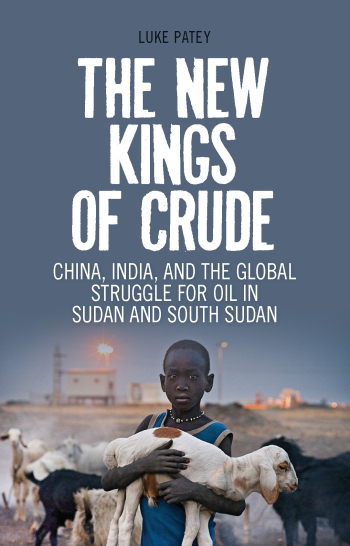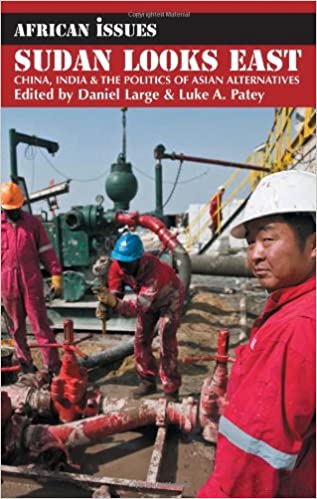The need for oil in Asia’s new industrial powers, China and India, has grown dramatically. The New Kings of Crude takes the reader from the dusty streets of an African capital to Asia’s glistening corporate towers to provide a first look at how the world’s rising economies established new international oil empires in Sudan, amid one of Africa’s longest-running and deadliest civil wars. For over a decade, Sudan fuelled the international rise of Chinese and Indian national oil companies. But the political turmoil surrounding the historic division of Africa’s largest country, with the birth of South Sudan, challenged Asia’s oil giants to chart a new course.
Luke Patey weaves together the stories of hardened oilmen, powerful politicians, rebel fighters, and human rights activists to show how the lure of oil brought China and India into Sudan—only later to ensnare both in the messy politics of a divided country. His book also introduces the reader to the Chinese and Indian oilmen and politicians who were willing to become entangled in an African civil war in the pursuit of the world’s most coveted resource. It offers a portrait of the challenges China and India are increasingly facing as emerging powers in the world.
Reviews
‘To grasp the new world of oil, you must plumb China’s role in Africa. Only, no one has penetrated it — until Luke Patey in his very welcome new book.’
‘As Mr Patey writes, despite worsening returns and growing unease, Sudan remains the “largest overseas achievement” of the state-owned oil companies of both China and India. […] Patey’s book has pen-portraits of the individuals who spearheaded and maintained exploration programmes in Sudan, … the “new kings of crude” [who] may yet have a role in trying to quell the violence in the two Sudans.’
The New Kings of Crude is a clear-eyed account of the machinations of the newest players in the global oil business… Patey sketches deft portraits of the principal personalities and institutions that shaped the development of the petroleum sector in Sudan, China and India.’
‘Over thirty-five years, Sudan has been a crucible for both American and Asian oil policies: not only have Sudan’s war and government been deeply influenced by the politics and finance of oil, but the battles over Sudan’s oil production have had a remarkable influence on the global petroleum business. Luke Patey’s remarkable book— an indispensable and comprehensive account of the encounter between big oil and Sudan — includes important new material on China’s strategy of internationalizing oil production and India’s seminal but under-recognized entry into the global oil business.’
‘An important, rigorously researched and fully documented book …[that] will undoubtedly become the standard reference text for those interested in the history and evolution of the oil industry in Sudan and South Sudan and the implications it has for the political economy of those countries… the latter part of the book reads more like a thriller [than] a detailed history book, engaging and absorbing the reader in the complexities it illuminates.’
‘Luke Patey has written a thoroughly engaging book on the impact of Africa’s longest-running civil wars in Sudan on the global ambitions of Chinese and Indian national oil companies. He lucidly explores how this now divided country shaped and constrained the aspirations of these oil giants, and explains excellently the influence and limitations of Asia’s two powerful countries, particularly China, on their national oil companies.’
‘Patey’s book is meticulously researched, mixing knowledge and in-depth analysis of the oil industry in both Sudans in the context in the countries’ conflicts… a must for Sudan watchers, China watchers and those who watch the twists and turns of the global oil and energy industries.’
‘…an intricately researched book … Patey’s mastery of the subject is clear, and this long-form analysis is a welcome addition to a surprisingly empty bookshelf on the subject. … The New Kings of Crude is written in a personable and character-driven style, making it accessible to the general reader and those with an academic interest. Its greatest strength, however, is that it provides a comprehensive history to the never-ending complexities of Sudanese politics which continue to dictate events to this day.’
‘[Patey] presents a solid, exhaustive account of how Sudan, while allowing China and India to expand their international footprints, proved a coming-of-age for both. The scholarship is obvious, but Patey also tells a cracking tale.’
‘Rather than describing a passive engagement with external actors that so often is used to define African countries’ policies, this book offers a refreshing look at Africa’s direct engagement and influence through its civil wars, rebellions, trade, and resources—proving an indispensable read for a clear understanding of the issues surrounding Sudan and South Sudan’s current crisis.’
‘Patey’s core message is surely a sound one: “China” and “India” are not monolithic actors; even state corporations have their own internal dynamics, and their own interests, and have limited leverage over the sovereign governments with which they deal. The new “kings of crude” rest uneasily on their thrones.’
By successfully turning to China, Malaysia and India from the mid-1990s, amidst civil war and political isolation, Khartoum’s ‘Look East’ policy transformed Sudan’s economy and foreign relations. Sudan, in turn, has been a key theatre of Chinese, Indian and Malaysian overseas energy investment. What began as economic engagements born of pragmatic necessity later became politicized within Sudan and without, resulting in global attention. Despite its importance, widespread sustained interest and continuing political controversy, there is no single volume publication examining the rise and nature of Chinese, Malaysian and Indian interests in Sudan, their economic and political consequences, and role in Sudan’s foreign relations. Addressing this gap, this book provides a groundbreaking analysis of Sudan’s ‘Look East’ policy. It offers the first substantive treatment of a subject of fundamental significance within Sudan that, additionally, has become a globally prominent dimension of its changing international politics (co-edited with Daniel Large).


